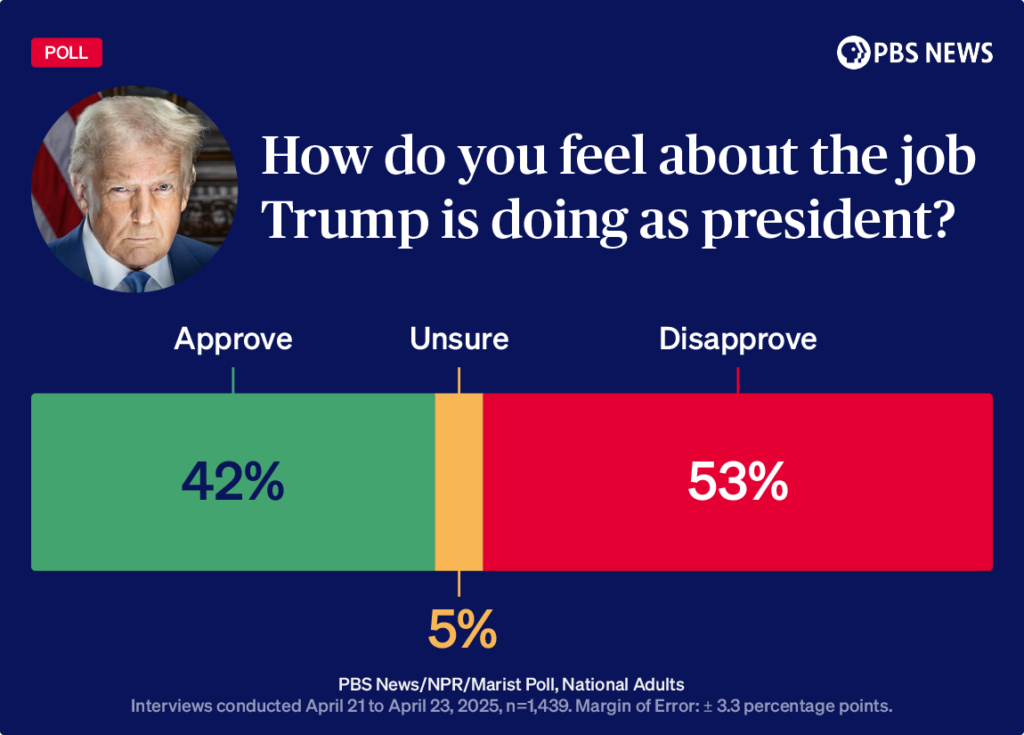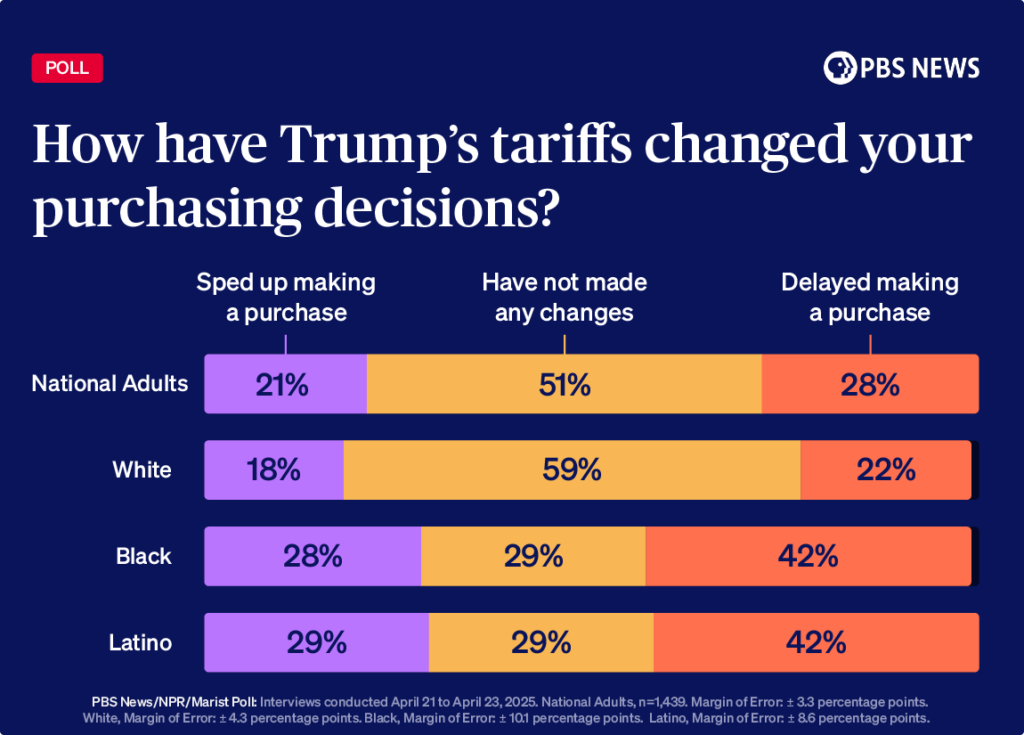



As President Donald Trump celebrates his first 100 days in office, a new PBS News/NPR/Marist poll finds that a plurality of Americans give him a failing grade.
Forty-five percent of U.S. adults rated Trump’s return to the Oval Office an “F,” including 80 percent of Democrats and 49 percent of independents. At the other extreme, 23 percent of Americans, including 54 percent of Republicans, gave the president an “A.”

About half of U.S. adults say Trump’s second term has had a mostly negative effect on their lives, and a majority believe he is rushing to make changes without considering the effects of his actions.
WATCH: Breaking down the first 100 days of Trump’s 2nd term and the effects of his agenda
To Lee Miringoff, director of the Marist Institute for Public Opinion, that polarization — Republicans supporting Trump, while Democrats oppose him — is expected. However, the fact that independents are “not at all in his corner right now is something that may ultimately serve as a wake-up call” to some members of Congress who will have to face voters in the midterm elections, he said.
When Trump was approaching 100 days during his first term in 2017, Marist polling found that the percentages of Americans flocking to the best or worst grades — giving him either an A or an F — were both lower than today. Instead, there was a greater mix of Bs, Cs and Ds. Among independents, about 3 in 10 gave him a failing grade eight years ago.
Midterms are a long way off, but independents right now are giving the president a “thumbs down,” Miringoff said.
Daniel Nowokunski, an independent who voted for Kamala Harris in the 2024 election, gives Trump an “F” for his second 100-day performance.

Graphic by Jenna Cohen/ PBS News
The Vermont resident said getting basic questions answered about Social Security benefits has been a challenge as the Department of Government Efficiency, led by Elon Musk, seeks to shrink the federal agency in staffing and possible office closures. Using the agency’s phone services, Nowokunski said he was placed on hold for an hour and 20 minutes before getting disconnected and having to start over again.
Nowokunski said he’d give Trump’s performance a better grade “if he lived up to one thing he was going to do, just one thing.”
More key takeaways:
- Just more than half — 51 percent — of U.S. adults say Trump is moving the country in a direction that is a change for the worse, compared to 42 percent who say it is a change for the better. Among voters who make less than $50,000 a year, 50 percent say it’s a worse change, while 43 percent say it’s a better change.
- Nearly half – 49 percent – of Americans said the policies Trump has implemented so far have had a mostly negative impact on their lives. Another 32 percent said there’s been a mostly positive impact, while 20 percent said they had experienced no impact personally.
- About 6 in 10 Americans say Trump is rushing to make changes without considering their impact — a 5-point jump from when this question was last asked in March. Close to 4 in 10 Americans say Trump is doing what needs to get done to get the government back on track.
“The shine has come off,” said Amy Walter of the Cook Political Report with Amy Walter. “What voters are saying right now is that while ‘move fast and break things’ may be popular for some Silicon Valley tech executives, it’s really not popular with voters when they think about the government and the economy in particular.”
Trump’s sinking ratings
Trump’s job approval numbers worsened slightly from a month ago, when he was enjoying a political honeymoon.
A majority of Americans — 53 percent — disapprove of his leadership, a four-point drop since March, just outside the margin of error. Another 42 percent approve, a three-point drop that is within the margin of error. The percentage of Americans who strongly approve of Trump dropped six points.

Graphic by Jenna Cohen/ PBS News
After months of Trump’s campaign promises, voters have had a few months to see how his policies and presidency have affected their lives.
“Are we looking at a temporary blip or is this a trend?” Miringoff said of these findings.
WATCH: The most consequential moments from the first 100 days of Trump’s second term
The next month or so will reveal how Americans overall react to Trump’s policies and whether his administration can provide “greater clarity” on priorities like tariffs, he added.
When asked about Trump’s handling of the economy, 39 percent said they approved. Another 55 percent disapproved, while 6 percent were unsure. This is close to a 10-point drop from where his economy approval ratings hovered in 2019 and 2020, in the final years of his first term, according to Marist’s polling data.
Although the president repeatedly promised to turn around Americans’ financial prospects on Day 1, the prices of many key essentials haven’t come down 100 days later.
Sixty-four percent of Americans say they think grocery prices will rise in the next six months, including 64 percent of independents and 89 percent of Democrats. Among Trump’s base, the reaction is more varied. Thirty-five percent of Republicans think prices will increase, while 31 percent say they’ll decrease and another 34 say they’ll remain about the same.
WATCH LIVE: White House holds news briefing with Bessent, marking Trump’s 100 days in office
The core reason Trump won in 2024 was because voters believed “he held greater promise for addressing” their concerns about the economy and inflation compared to President Joe Biden, Republican strategist Kevin Madden said. He added that nostalgia for Trump’s pre-COVID economy played a role.

President Donald Trump holds a chart as he delivers remarks on reciprocal tariffs at the White House. Photo by Brendan Smialowski/ AFP via Getty Images
Yet Trump’s tariffs and trade policies have jump-started a new level of concern and anxiety among Americans, especially among independents and the “most nomadic parts of the electorate,” or moderates of both major political parties, Madden said.
Nowokunski, who lives in a small, rural town, shops at a grocery store about 45 minutes away. A carton of eggs has cost close to $7, while bigger ticket items have dealt an even greater sticker shock.
“Everything’s just so expensive now,” he said, especially with food prices.
What the poll also found about the economy:
- 58 percent of Americans disapproved of Trump’s handling of tariffs, while 34 percent approved. Another 8 percent were unsure.
- A similar share of Americans — 60 percent — think the current economic conditions are mostly a result of Trump’s own policies, rather than a situation he inherited.
- 57 percent of Americans think tariffs hurt the U.S. economy, compared to 33 percent who say they help the economy. Twenty-two percent of Republicans said they believe tariffs hurt the economy, while 56 percent say they help.
“I do think voters are pretty clear-eyed about the fact that whatever is happening in the economy, whether it’s close to home or whether it is worldwide, that it is the result of Donald Trump and his policies,” Walter said. “In other words, it’s not that he is reactive to a current economic situation as much as he is making his own economic weather system.”
Mark Knapchuck Jr. is a Michigan independent who voted for Trump in 2017. He liked his energy and thought he’d be a great leader. In the 2024 race, he voted for Trump’s opponent, former Democratic Vice President Kamala Harris, in part because he felt Harris had a better direction on what needed to be done with the economy.
READ MORE: Examining Trump’s progress on his promises, 100 days in
A truck driver for about 20 years, Knapchuck said tariffs have hurt all of the plants where he makes deliveries. He’s also stopped purchasing as much electronics and plans to not buy any more cars until his current vehicle can no longer be fixed. Consumers often have to foot the bill for tariffs, he added.
“At the end of the day, it’s us that has to pay,” Knapchuck said.
How voters see Trump handling immigration, another key issue for the president
Trump is performing slightly better overall with voters on immigration, and continues to have strong support from Republicans on his handling of the issue, with 87 percent approving.
But for all the talk in the Trump orbit that immigration is a winning issue among voters, it’s not a majority of support, Walter said.
Overall, 44 percent of Americans approve of his handling of immigration, compared to 52 percent who disapprove. That number is almost as strong as the percentage of people who disapprove of his handling of the economy (55 percent), Walter pointed out.
“He was much better convincing Americans about the failings of the Biden administration than he has about the successes or lack thereof of his first 100 days,” Miringhoff said.
If there is a glimmer of good news for Trump in the poll, Madden said, it’s that there seems to be a Republican-based “antibody effect” around the president’s policies. These are the Republican voters rallying to the president’s defense and keeping a strong base in place, he said.
The problem right now for Trump is in the “big middle,” Madden added.
These are voters who were with Trump in November 2024, but due to “their views of the economy, they’re now starting to migrate again,” either going back to Democrats or deciding to become undecided again, he said.
“That’s why you have to be very careful with how you invest the political capital that you get from one election to the next,” he added.
Some other findings from this poll:

Graphic by Jenna Cohen/ PBS News
- Nearly half of Americans say they have changed their purchasing decisions due to the Trump administration’s tariff actions. Twenty-one percent say they sped up making a decision, while 28 percent said they delayed making a decision. Another 51 percent say tariffs have not affected their decision-making.
- 85 percent of Americans say they strongly or somewhat agree that the president of the United States should obey federal court rulings even if they don’t like it. That number includes 79 percent of Republicans and 84 percent of independents.
- Elon Musk’s favorability rating continues to sink. Thirty-seven percent of Americans say they have a favorable view of Musk, down from 39 percent in March. That change is mirrored by public opinion on the Department of Government Efficiency, which is favored in this poll by 36 percent, down from 39 percent in March.
- 49 percent of Americans disapprove of how the Trump administration has handled the deportation of Kilmar Abrego Garcia to El Salvador. 35 percent say they approve of the handling and another 15 percent are unsure.
PBS News, NPR and Marist Poll conducted a survey from April 21 through April 23, 2025, that polled 1,439 U.S. adults with a margin of error of 3.3 percentage points, and 1,324 registered voters with a margin of error of 3.5 percentage points.
Insightful, trustworthy journalism, for everyone.
Your tax-deductible donation ensures our vital reporting continues to thrive. Support PBS News Hour now.

















































